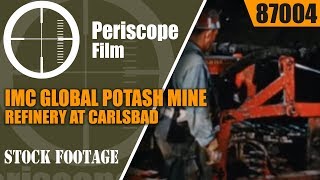IMC GLOBAL POTASH MINE AND REFINERY AT CARLSBAD, NEW MEXICO 1950s MOVIE 87004
IMC GLOBAL POTASH MINE AND REFINERY AT CARLSBAD, NEW MEXICO 1950s MOVIE 87004

Potash is produced worldwide at amounts exceeding 30 million tonnes per year, mostly for use in fertilizers. Various types of fertilizer-potash thus constitute the single largest global industrial use of the element potassium. Potassium was first derived by electrolysis of caustic potash (aka potassium hydroxide), in 1808.
The International Minerals & Chemical Corporation was incorporated in June 1909 as International Agricultural Corporation. It initially owned a number of fertilizer manufacturing plants in Tennessee, all of the capital stock of the Kaliwerke Sollstedt Gewerkschaft Potash Mines in Germany, large deposits of phosphate rock in Tennessee, and all of the capital stock in the Prairie Pebble Phosphate Company in Florida. It added manufacturing plants in Alabama, Georgia, Maine, New York, Pennsylvania, and Tennessee within the first few years.
In April 1942 the company merged with United Potash & Chemical Corporation, a subsidiary engaged in the mining and refining of potash salt as well as the production of potassium chloride, potassium sulphate (both fertilizer ingredients), and magnesium chloride, the base for making magnesium metal.
The period during World War II was good for International Minerals, as competing imports from Germany were suspended. The company continued to perform well in the postwar period. In 1947, reflecting record demand for fertilizer, International Minerals reported the best year ever with sales over $50 million, up from $41.3 million the year prior. To take advantage of the heavy demand, the company embarked on a $21 million program to expand production, including new plants such as one in San Jose, California, to make monosodium glutamate, a seasoning agent.
The company continued to achieve new records for sales and earnings during the 1950s and 1960s. Sales were $93.6 million in 1954; ten years later, in 1964, sales were $225.7 million.
International Minerals began acquiring other companies in the mid-1960s. In December 1966 it acquired the manufacturing assets of E.J. Lavino & Company, makers of refractories for the steel industry. In 1968 it added both Chemicals, Inc., of Bartow, Florida, and Continental Ore Corporation of New York. These acquisitions helped lift sales from $299.3 million in 1966 to $501.8 million only two years later.
International Minerals & Chemical Corporation had become a leading producer of mineral and chemical products for industry and agriculture by 1975. It had operations in thirty-five states, as well as in Canada and fifteen other foreign countries.
We encourage viewers to add comments and, especially, to provide additional information about our videos by adding a comment! See something interesting? Tell people what it is and what they can see by writing something for example like: “01:00:12:00 — President Roosevelt is seen meeting with Winston Churchill at the Quebec Conference.”
This film is part of the Periscope Film LLC archive, one of the largest historic military, transportation, and aviation stock footage collections in the USA. Entirely film backed, this material is available for licensing in 24p HD and 2k. For more information visit http://www.PeriscopeFilm.com

Man they were swell jobs
Usual WOOZLE ‘prehistoric ocean millions of years ago’!
Rubbish the entire layers of potash were laid down during The Flood 4,350 years ago!
Narrated by Fred McMurray?
My dad worked underground running undercutter and later was a painter above ground from early 40’s to the 60’s his partner and his him had a picture of them running a undercutter in the reception area of the main office. I saw it once. I wish I could find a copy of it. He did take a break to serve on the USS San Jacinto aircraft carrier Pacific theater WWII. He told me alot of stories. I always enjoyed them. Sad to hear the mine is closed I was going to call them and possibly find a picture of the mural. Thanks for a great video.
IMC Global recently merged with the fertilizer business of Cargill Incorporated to become The Mosaic Company.
This mine has been demolished all that is left are the head frames water tower and concrete monoliths it can be located at the eastern terminus of New Mexico Currycombo Road 235
Last 2 minutes are awesome! Love the pro-America speech on how this business is part of the community.
I worked at PCA from 1959 thru 1969 – best job I ever had except when I owned my own hearing aid business from 1970 to present
Usual WOOZLE at 4:31 ‘prehistoric ocean 250 millions of years ago’!
Rubbish the entire layers of potash were laid down during The Flood 4,350 years ago!